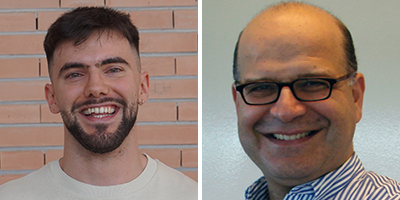Visiting PhD Student Wins Best Student Paper Award at 2024 IEEE ICIP Conference
In joint work with Professor Aggelos Katsaggelos, visiting PhD student Francisco Castro-Macías introduced a probabilistic approach to address the challenging problem of image artifact deblurring
Visiting PhD student Francisco Castro-Macías earned the Best Student Paper Award at the 2024 IEEE International Conference on Image Processing (ICIP), held in October in Abu Dhabi, United Arab Emirates.
 Castro-Macías is a PhD student at the University of Granada in Granada, Spain. He is co-advised by Aggelos Katsaggelos, the Joseph Cummings Professor of Electrical and Computer Engineering at Northwestern Engineering and (by courtesy) professor of computer science and radiology.
Castro-Macías is a PhD student at the University of Granada in Granada, Spain. He is co-advised by Aggelos Katsaggelos, the Joseph Cummings Professor of Electrical and Computer Engineering at Northwestern Engineering and (by courtesy) professor of computer science and radiology.
Renowned as a premier conference dedicated to image and video processing and computer vision, ICIP 2024 explored the theme of “Trustworthy Visual Data Processing.” The conference featured topics fidelity or faithfulness with respect to the original data, reliability, reproducibility, robustness, and sampling and explainability.
“I am very happy that our work is being recognized. This is the first major award I have received and is therefore special,” Castro-Macías said. “The work we have presented has a strong theoretical component, which can sometimes be overlooked in favor of experimental work in machine learning in general, and in image processing in particular.”
The winning paper, titled “Bayesian Blind Image Deconvolution Using an Hyperbolic-Secant Prior,” is coauthored by Katsaggelos; Fernando Pérez-Bueno (Basque Center on Cognition, Brain and Language); and Javier Mateos, Rafael Molina, and Miguel Vega (University of Granada).
In the work, the team addressed the problem of image deblurring. This involves recovering a latent clean image from an original blurred due to such factors as camera malfunction, unexpected motion, or other external events.
The team introduced a probabilistic approach that first estimates the blur and then produces a highly accurate reconstruction of the latent clean image using a class of functions that, until now, have not been applied in this field.
“Interestingly, these functions are well-known in financial mathematics, where they are used to model complex problems like option pricing,” Castro-Macías said. “Adapting them to image deblurring was a significant challenge, and we developed a novel technique to make this possible.”
“This is important because it not only improves the results in image deblurring but also opens the door to applying these functions to other image processing tasks, like improving image resolution or removing haze from images,” Castro-Macías continued.
As a next step in the research, the team aims to integrate their analytic algorithm technique with state-of-the-art deep learning methods.
“Adapting our approach to work with these methods could significantly improve both speed and performance,” Castro-Macías said.
Katsaggelos and Rafael Molina, a professor of computer science and artificial intelligence at the University of Granada, have published more than 170 papers during a research collaboration spanning more than 30 years. Castro-Macías is the tenth PhD student they have co-supervised.
During a three-month visit to Katsaggelos’s Image and Video Processing Lab last spring, Castro-Macías worked on developing a new approach for localizing unhealthy regions in medical pathology images, such as cancerous areas in whole slide images or hemorrhagic slices in CT scans. This work was been accepted to the 2024 Conference on Neural Information Processing Systems, held earlier this month.
